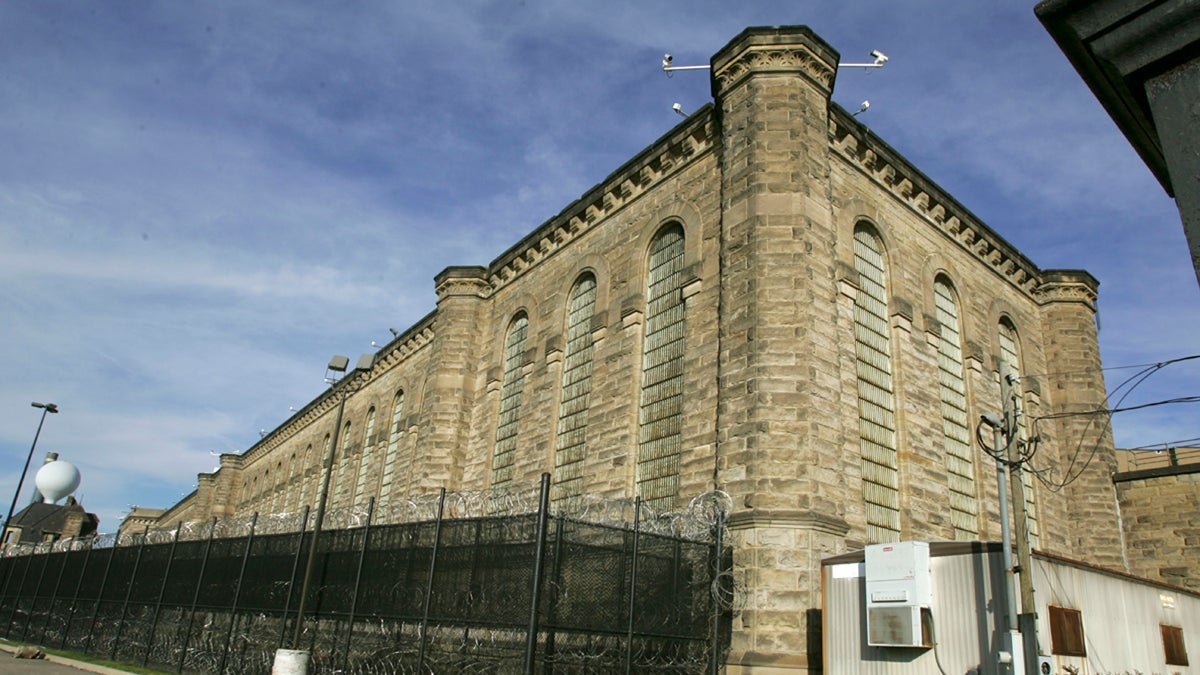Pa. looking for two state prisons to shut down in June

Fences and razor wire are seen around the yards behind the State Correctional Institution-Pittsburgh
Pennsylvania corrections officials plan to close two state prisons this summer and halve their halfway house population to dent a $200 million deficit that is driven, in part, by a declining inmate population, corrections secretary John E. Wetzel announced this morning.
Officials are considering five prisons for closure, including Frackville (near Pottsville), Pittsburgh, Mercer (between Pittsburgh and Erie), Retreat (near Wilkes-Barre), and Waymart (near Scranton). They’ll weigh facility age, size, location, operational cost, and specialty functions of the prisons in choosing which to close. Waymart, where many inmates with mental health issues are sent, and Pittsburgh, which houses medical services such as cancer treatment, could be trickier to close because of their specialized services, Wetzel added.
Officials will announce on Jan. 26 which two they’ll shutter, and the prisons will close June 30. That should save about $44 million to $82 million per facility, depending on which are picked for closure, and will affect about 2,500 inmates, who will be sent to other prisons, Wetzel said.
Pennsylvania incarcerates about 49,000 inmates in 26 state prisons, down from almost 52,000 in 27 prisons in 2012, according to the corrections department. (Two prisons, Cresson and Greensburg, closed and a new one, Benner, opened in 2013.) State prisons now operate, on average, at 87 percent of their bed capacity; the closures would bump that up to 92 percent, Wetzel said.
The state also will slash the number of inmates in its community corrections program (from 3,000 to about 1,500), after studies showed that inmates who spent time in halfway houses, even those considered low-risk, had higher recidivism rates than those released directly to the community, Wetzel said.
Officials hope staff attrition, overtime reductions, and other efficiencies will save even more, Wetzel said.
“The reality is that across the board, from the day I got in this job (in late 2010), every single lawmaker I’ve talked to has complained about corrections spending,” Wetzel said, of the department’s $2 billion budget. “We’ve gone through a process where we’ve systematically … reduced our prison population. The way you save money in corrections is to close prisons.”
The closures will affect about 800 staffers, but Wetzel said he hopes none will end up unemployed. That’s partly because they’ll be offered positions elsewhere in the department — but also because officials hope to rent out the mothballed prisons, either to other states grappling with prison crowding or to federal authorities trying to accommodate an anticipated spike in deportees during the next four years.
“If he’s going to ramp that up, they’re going to need capacity quickly,” Wetzel said of President-elect Donald Trump’s plan to deport undocumented immigrants with criminal records. “That would allow us to move our inmates out, backfill with those inmates [deportees], and not only not have to close our prison, but also give us the opportunity to bring some money. So we’re going to give that a shot. I described that to my staff today as a ‘Hail Mary,’ in football terms. I’m not sure how viable it is, but it’s something we certainly can pursue.”
Gov. Tom Wolf applauded the planned closures as necessary cost cuts to help the state close its budget deficit.
“By investing in the things that make Pennsylvania a better place, like reducing recidivism and improving our schools, we can ensure the long-term prosperity and safety of our commonwealth,” Wolf said. “I chose to invest in schools — not prisons— because it’s both the right thing to do and the smart thing to do.”
David Rudovsky, a civil-rights attorney who has sued over prison crowding, also cheered the closures as progress.
“That the state feels it’s in a position now to close some institutions, that’s good news,” Rudovsky said. “It shows there have been some efforts to reduce mass incarceration.”
Still, he said, “a number of states, including California, Texas, New York, New Jersey, and Georgia, have both reduced their prison populations substantially more than we have, with huge cost savings, while also reducing their crime rates.”
So Pennsylvania lawmakers, he added, have miles yet to go in prison reform.
“Pennsylvania has a large and increasingly larger number of people serving life without parole,” Rudovsky said. “Many of them are aging, and that becomes hugely expensive to care for a geriatric population that, by that point in their life, is not a risk to anyone. At the same time, we continue to lock up a lot of people for state time for relatively minor offenses like drug offenses.”
Corrections staff, inmates’ families and others with questions about the closures can email the department at ra-CRDOCClose@pa.gov and or call (888) 316-8950.
WHYY is your source for fact-based, in-depth journalism and information. As a nonprofit organization, we rely on financial support from readers like you. Please give today.

